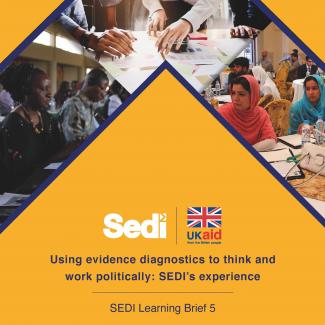
Using evidence diagnostics to think and work politically: SEDI's experience
Download publication files
This brief shares reflections from evidence diagnostic exercises (one in Pakistan and the other in Uganda) to understand the barriers and opportunities for strengthening evidence within two government agencies. The diagnositc exercise was undertaken as part of the Strengthening Evidence Use for Development Impact (SEDI) programme, funded by the UK Foreign, Commonwealth & Development Office, and sought to identified priority issues for the SEDI programme (and potential solutions it could explore).
In both Pakistan and Uganda, the diagnostic exercises were carried out by joint teams from the SEDI programme and from selected government agencies in each country. The exercises were led by the Sustainable Development Policy Institution (SDPI) in Pakistan, in partnership with the National Tariff Commission, and the Economic Policy Research Centre (EPRC) in Uganda, in partnership with the Office of the Prime Minister. SEDI’s capacity development and brokering workstreams, led by INASP and Oxford Policy Management (OPM) respectively, provided advisory support.
The SEDI team’s experience of conducting evidence diagnostics in Uganda and Pakistan shows how the technical workstreams and the country leads worked together to move from ‘thinking politically’ in the analysis phase of the programme towards ‘working politically’ in the implementation phase, using the authority, acceptance and ability (AAA) model and the Context Matters Framework.
Also from SEDI:
- Understanding the demand and use of evidence through a ‘political economy +’ approach: the SEDI experience in Ghana, Pakistan, and Uganda
- The political economy of evidence use in Ghana, Pakistan, and Uganda: What SEDI has learned
- Civil Service capacity development in Ghana: Lessons from past and existing structures and initiatives
